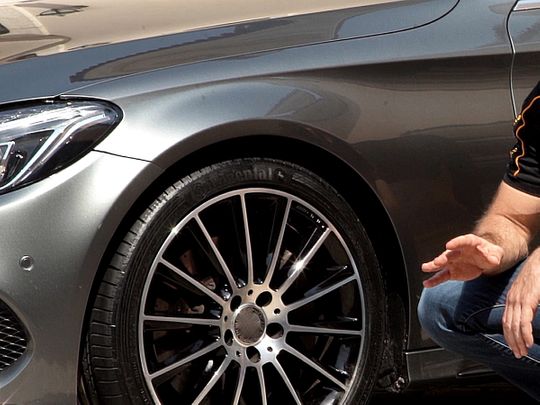
As many motorists across the Middle East consider taking to the roads, with restrictions being eased it is important to pay attention to your car, especially after its been parked for weeks, maybe months. Gulf News speaks with Continental, a German tyre brand based in the UAE, who give 7 tips on how to stay safe on the road this summer.
A tyre Inspection
Leaving a car unused for extended periods can lead to unexpected issues. For example, the tyres might develop flat spots because of the weight of the vehicle pressing down on them. It is important to keep the tyres properly inflated at all times, and to inspect them carefully before heading back out on the road - visible issues such as bulges, cracks or blisters may be spotted, and require immediate attention.
Check your tyre pressure
In normal circumstances, tyre pressures should be checked regularly (every two-four weeks). Before returning to the roads, Continental recommends that drivers check the tyre pressure on their car. If pressures are too high or too low, this can cause a range of potentially dangerous issues, including overheating and loss of traction. Recommended tyre pressures can normally be found on the driver’s door post.
Check your battery
While cars have been parked up, the batteries haven’t been activated and may lose their charge. Before hitting the roads, Continental recommends switching on the engine and moving the car around a little first. If you have trouble starting, you may need to replace the battery with a new one
Making sure your breaks are ok
With a lack of movement, brakes may be at risk of degradation. Upon starting the car, it should be moved around a little to check the brakes. If the brakes are squeaky, it’s time to change them. As always, if the car is likely to remain unused for a prolonged period it should nevertheless be moved regularly to ensure the brakes operate correctly.
Checking your levels
One of the most important aspects of car care is maintaining the right fluid and lubricant levels. As a precautionary measure before driving, it is important to check that the engine oil, transmission fluid, brake fluid and coolant are at the right level. A lack of movement can lead to certain components degrading, in turn causing spills and leaks. Ensuring levels are correct will help prevent potentially dangerous engine failure, brake failure or even transmission failure.
Are your wipers still working?
While stationary, dirt may build up around the windscreen wipers, potentially damaging them and reducing their effectiveness when used. It is a good idea to not only clean the wipers, but also the windscreen and paintwork to ensure the car remains in good condition for when it is used again.
Make sure you always have a spare tyre
As life gradually returns to normal, drivers should also give their spare tyre a check-up for any damage or air pressure loss. A spare tyre will always come in handy in the event of an emergency.












